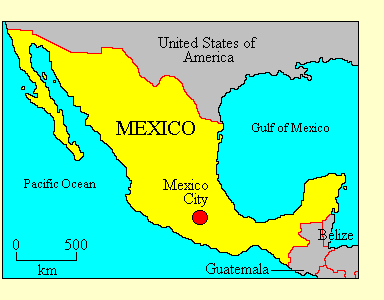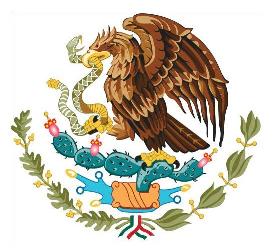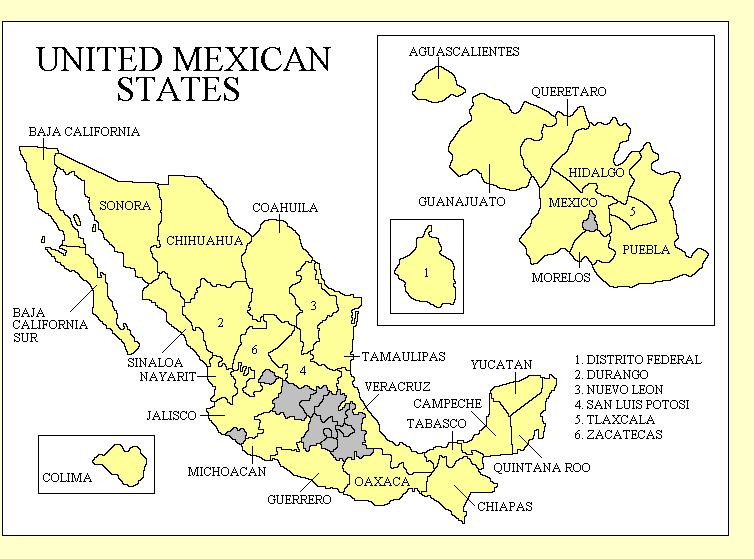

UNITED MEXICAN STATES
• Official name: Estados Unidos Mexicanos (United Mexican States)
• Location: North America
• International organisations: Asia-Pacific Economic Co-operation Forum, Group of Twenty, Organisation of American
States, Organisation for Economic Co-operation and Development, United Nations, World Trade Organisation
• Borders: Belize, Guatemala, United States of America
• Coastline: Gulf of Mexico, North Pacific Ocean
• Land area: 1,972,550 Km2
• Population: 111,200,000
• Annual GDP (PPP) per capita: US$13,500 (2009 CIA estimate). World ranking: 64
• Ethnicity: The majority of the population (60%) is of mestizo
(mixed Amerindian-Spanish) descent, while most of the remainder are
of entirely Amerindian descent. A minority, 9%, is of entirely
European (mostly Spanish) descent.
• Languages: Spanish is the official language. Mayan, Nahuatl
and other indigenous languages are still spoken in some areas.
• Religion: Nearly 90% are at least nominally Catholic
Christians.
• Form of government: Federal presidential democracy. Mexico is
divided into 31 states and one federal district.

• Capital: Mexico City (Ciudad de Mexico)
• Constitution: The
Constitution of the United Mexican States came into effect
on 5 February 1917. It has been substantially amended since.
• Head of state: The President, elected by direct universal
franchise for a single six-year term.
• Head of government: The President, who appoints the members of
the Cabinet.
• Legislature: The
Congress of the Union (Congreso de la Union) is a bicameral
legislature. The Chamber of Deputies (Camara de
Diputados) has 500 members, elected for three-year terms. Of
these, 300 are elected from single-seat constituencies, and 200
are elected by proportional representation.
The Chamber of Senators (Camara de Senadores) has 128 members,
elected for six-year terms. Of these 96 are elected from the states,
three per state, and 32 by proportional representation.
• Electoral authority: The
Federal Electoral Institute conducts national elections.
• Freedom House 2011 rating: Political Rights 3, Civil Liberties 3
• Transparency International Corruption Index: 31% (98 of 178 countries rated)
• Reporters Without Borders Press Freedom 2010 Index: 52.5% (136 of 178 countries rated)
• Heritage Foundation Economic Freedom 2010 Index: 67.8% (48 of 179 countries rated)
Political history
Mexico was conquered by the Spanish in 1521, and ruled by Spain
for nearly 300 years. It declared its independence in 1810, but did
not become fully independent until 1821. For the next century Mexico was
ruled by factions of its tiny European elite, during which time there were
frequent revolutions, coups and civil wars. From 1863 to 1867 Mexico
had a Hapsburg "Emperor" under French control.

From 1876 to 1911, with one break, Mexico was ruled by the
dictator Porfirio Diaz. On his resignation a reform movement
succeeded in having Francisco Madero elected President. His assassination
in 1913 sparked a revolution and a civil war, which resulted in the
establishment of a militantly anti-clerical and semi-socialist regime.
Out of this regime came the
Institutional Revolutionary Party (PRI),
which ruled Mexico behind a facade of constitutional democracy for 70 years.
As PRI rule relaxed in the 1980s, and also became more corrupt,
a reform movement developed. Presidents Carlos Salinas (1988-94) and
Ernesto Zedillo (1994-2000) allowed increasingly free elections and an
independent media. The result was the election in 2000 of Vicente Fox
of the National Action Party
(PAN), the first non-PRI President for over 70 years. He was succeeded in 2006 by
another PAN president, Felipe Calderon.
Today the PRI is the principal opposition party, still formally
committed to socialism but now more-or-less accepting of pluralism and
the free market system. The revolutionary tradition is better represented
by the Party of the
Democratic Revolution (PRD), which has a big following among the poor, and whose candidate
Andres Manuel Lopez Obrador came very close to winning the 2006 election. At the
2008 legislative elections, however, the PRI staged a comeback, winning control of both chambers
by gaining seats from both PAN and PRD.
Freedom House's 2009
report on Mexico
says: "Mexico is an electoral democracy... Mexico's Federal Electoral Institute, which supervises elections and enforces
political party laws, has come to be viewed as a model for other countries. The 2006 elections were considered generally free
and fair, but there were many complaints, especially by the opposition PRD, concerning negative advertising and the use of
administrative resources on behalf of the presidential victor, Felipe Calderon of the ruling PAN. In response, an electoral
reform was passed in 2007 to strictly regulate campaign financing and the content of political advertising. Opinion was
mixed regarding the efficacy of the reform in its first major test, the 2009 Chamber of Deputies elections, but the contest
overall was considered free and fair... Official corruption remains a serious problem. Billions of dollars in illegal drug
money is believed to enter the country each year from the United States, and there is a perception that drug money affects
politics, particularly on the state and local levels... Legal and constitutional guarantees of free speech have been
gradually improving, but the security environment for journalists has deteriorated markedly. Some major media outlets are no
longer dependent on the government for advertising and subsidies, and the competitive press has taken the lead in denouncing
official corruption... Constitutional guarantees regarding free assembly and association are generally respected...
The justice system remains plagued by delays and unpredictability."
Updated November 2011
|


